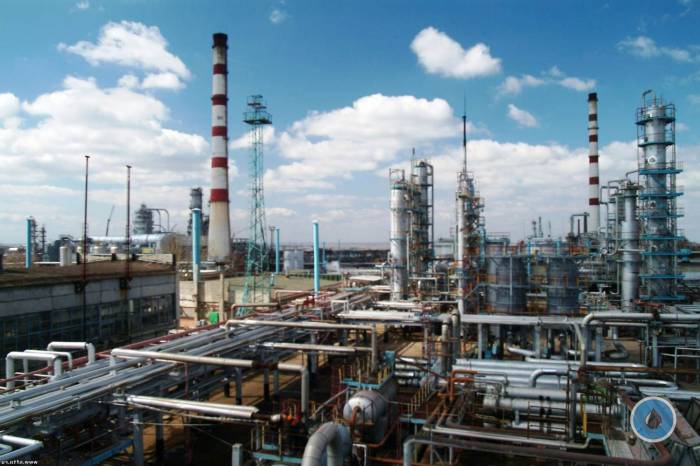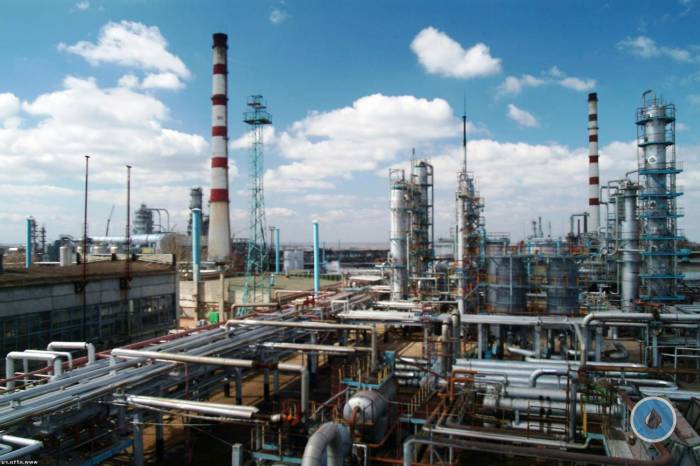Архив от 14 Марта 2016 - Нефтегазовые новости
++
 In 2012, TNK-BP refineries in Lisichansk (Ukraine) and in Ryazan will replace catalysts used in their fluid catalytic crackers. New catalysts were selected by Chemical Process Engineering Research Institute, which studied samples provided by potential suppliers in its test catalytic cracker, and Jacobs Consultancy Ltd. The test results showed that catalyst replacement would yield a substantial economic benefit.
Catalysis is a fundamental oil refining process. Technical progress in this industry greatly depends on the catalysis development, which is, therefore, the focus of continuous efforts for many companies. Manufacturers are constantly marketing new catalysts with improved efficiency for fluid catalytic cracking (FCC) units. Catalysts currently used at TNK-BP refineries were introduced more than four years ago, so the decision was taken in January 2011 to replace them with more advanced grades. International ExperienceIn the global practice, several methods are used to benchmark FCC catalyst efficiency, each having its advantages and disadvantages. One of these methods is production tests at an operating unit: the thus obtained results reliably reflect catalyst behavior under actual operating conditions. However, it takes six to nine months to obtain the first results under these tests after the previous catalyst is partially or completely replaced with the new product. Any changes to this process may lead to distorted benchmarking results.Another benchmarking method is mathematical simulation of catalyst system performance with a software package that kinetically models the reactor block and is adapted to real operating conditions. This method is normally used by suppliers forming technical proposals, but it does not accurately forecast efficiency of a specific catalyst in a particular industrial system. A better idea of catalyst performance in a particular process system may be obtained by comparat ... Читать дальше »  In 2012, TNK-BP refineries in Lisichansk (Ukraine) and in Ryazan will replace catalysts used in their fluid catalytic crackers. New catalysts were selected by Chemical Process Engineering Research Institute, which studied samples provided by potential suppliers in its test catalytic cracker, and Jacobs Consultancy Ltd. The test results showed that catalyst replacement would yield a substantial economic benefit.
Catalysis is a fundamental oil refining process. Technical progress in this industry greatly depends on the catalysis development, which is, therefore, the focus of continuous efforts for many companies. Manufacturers are constantly marketing new catalysts with improved efficiency for fluid catalytic cracking (FCC) units. Catalysts currently used at TNK-BP refineries were introduced more than four years ago, so the decision was taken in January 2011 to replace them with more advanced grades. International ExperienceIn the global practice, several methods are used to benchmark FCC catalyst efficiency, each having its advantages and disadvantages. One of these methods is production tests at an operating unit: the thus obtained results reliably reflect catalyst behavior under actual operating conditions. However, it takes six to nine months to obtain the first results under these tests after the previous catalyst is partially or completely replaced with the new product. Any changes to this process may lead to distorted benchmarking results. Another benchmarking method is mathematical simulation of catalyst system performance with a software package that kinetically models the reactor block and is adapted to real operating conditions. This method is normally used by suppliers forming technical proposals, but it does not accurately forecast efficiency of a specific catalyst in a particular industrial system. A better idea of catalyst performance in a particular process system may be obtained by c ... Читать дальше » |

